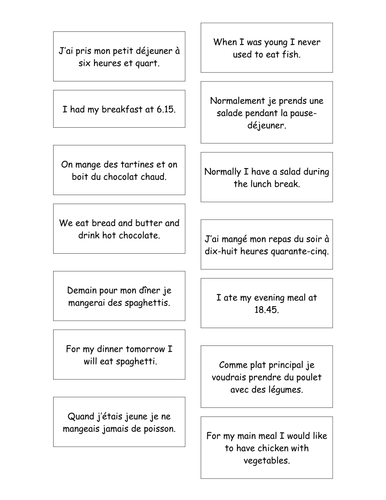

This role-play includes a range of meals, tenses and food vocabulary. It includes an extension task for strongers students. Example extract:
Les repas.
A. Qu’est-ce que tu prends normalement comme petit déjeuner?
B. D’habitude je mange des céréales/ des tartines/ un yaourt/ des fruits/ un croissant/ un pain au chocolat/ du pain grillé avec du beurre et de la confiture et je bois un jus d’orange/ un thé/ un café. C’est délicieux/ dégoutant.
A. Qu’est-ce que tu prends normalement comme déjeuner?
B. Souvent je prends un sandwich au fromage/ un paquet de chips/ une pomme/ un fruit et une bouteille d’eau/ un jus de fruits/ une limonade/ un coca.
French - English Matching Cards: Food, Meals, Restaurant.
Expressions:
J’ai pris mon petit déjeuner à six heures et quart.
I had my breakfast at 6.15.
On mange des tartines et on boit du chocolat chaud.
We eat bread and butter and drink hot chocolate.
Demain pour mon dîner je mangerai des spaghettis.
For my dinner tomorrow I will eat spaghetti.
Quand j’étais jeune je ne mangeais jamais de poisson.
When I was young I never used to eat fish.
Normalement je prends une salade pendant la pause-déjeuner.
Normally I have a salad during the lunch break.
J’ai mangé mon repas du soir à dix-huit heures quarante-cinq.
I ate my evening meal at 18.45.
Comme plat principal je voudrais prendre du poulet avec des légumes.
For my main meal I would like to have chicken with vegetables.
You may choose to have different levels of challenge. For example,
Level 1 = match the cards and discuss the pronunciation.
Level 2 = match the cards , discuss the pronunciation, identify the tenses and then have quick fire questions from French to English,
whereby 1 student closes their eyes and their partner reads out the French cards which the student must translate into English from memory.
Level 3 = As Level 2 but the quick fire questions are from English to French.
Following checking there are 2 fun games to play, either pelmenism or a game I learnt in Japan called Karuta. In Karuta the students put the English language cards to one side and spread out the French cards in front of them. I then say the English and the students compete to touch the correct French card first. Whoever touches it first wins the card. The student with the most cards at the end of the game wins. The students love this game!
Les repas.
A. Qu’est-ce que tu prends normalement comme petit déjeuner?
B. D’habitude je mange des céréales/ des tartines/ un yaourt/ des fruits/ un croissant/ un pain au chocolat/ du pain grillé avec du beurre et de la confiture et je bois un jus d’orange/ un thé/ un café. C’est délicieux/ dégoutant.
A. Qu’est-ce que tu prends normalement comme déjeuner?
B. Souvent je prends un sandwich au fromage/ un paquet de chips/ une pomme/ un fruit et une bouteille d’eau/ un jus de fruits/ une limonade/ un coca.
French - English Matching Cards: Food, Meals, Restaurant.
Expressions:
J’ai pris mon petit déjeuner à six heures et quart.
I had my breakfast at 6.15.
On mange des tartines et on boit du chocolat chaud.
We eat bread and butter and drink hot chocolate.
Demain pour mon dîner je mangerai des spaghettis.
For my dinner tomorrow I will eat spaghetti.
Quand j’étais jeune je ne mangeais jamais de poisson.
When I was young I never used to eat fish.
Normalement je prends une salade pendant la pause-déjeuner.
Normally I have a salad during the lunch break.
J’ai mangé mon repas du soir à dix-huit heures quarante-cinq.
I ate my evening meal at 18.45.
Comme plat principal je voudrais prendre du poulet avec des légumes.
For my main meal I would like to have chicken with vegetables.
You may choose to have different levels of challenge. For example,
Level 1 = match the cards and discuss the pronunciation.
Level 2 = match the cards , discuss the pronunciation, identify the tenses and then have quick fire questions from French to English,
whereby 1 student closes their eyes and their partner reads out the French cards which the student must translate into English from memory.
Level 3 = As Level 2 but the quick fire questions are from English to French.
Following checking there are 2 fun games to play, either pelmenism or a game I learnt in Japan called Karuta. In Karuta the students put the English language cards to one side and spread out the French cards in front of them. I then say the English and the students compete to touch the correct French card first. Whoever touches it first wins the card. The student with the most cards at the end of the game wins. The students love this game!
Something went wrong, please try again later.
This resource hasn't been reviewed yet
To ensure quality for our reviews, only customers who have purchased this resource can review it
Report this resourceto let us know if it violates our terms and conditions.
Our customer service team will review your report and will be in touch.
£2.00
